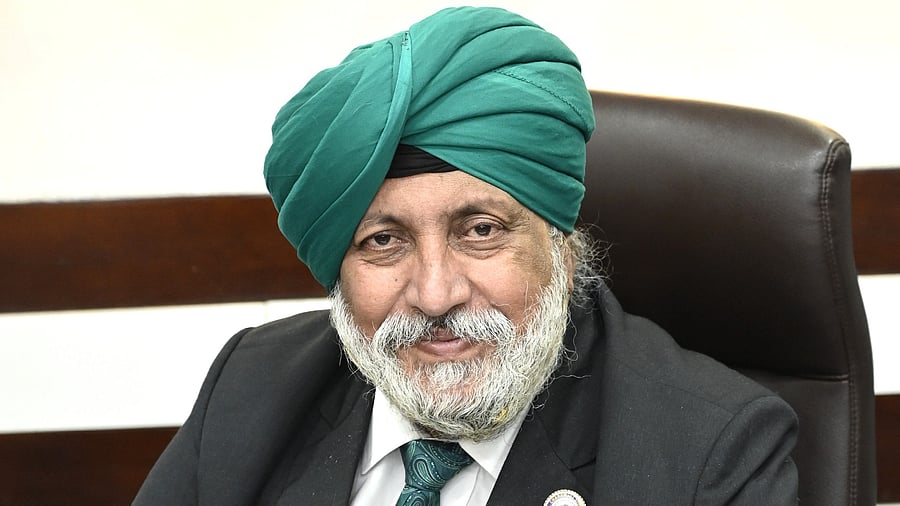
Credit: Special arrangement
The Institute of Chartered Accountants of India (ICAI), a statutory body for the regulating and developing the profession of chartered accountancy in India, has recently taken up a number of high-profile financial irregularities cases including IndusInd Bank and Gensol Engineering and Byju’s in the past. In conversation with DH’s Gyanendra Keshri, ICAI President CA Charanjot Singh Nanda talks about these cases and initiatives taken by the accountancy regulatory body to make the system robust. Edited excerpts.
Several financial frauds and insider trading cases have been reported in the recent months. What is the update in IndusInd Bank and Gensol Engineering cases?
ICAI constituted Financial Reporting Review Board (FRRB) in July 2002 to strengthen the financial reporting practices and to improve audit quality in India.The Board reviews the general-purpose financial statements of various enterprises and auditors’ report thereon with a view to determine compliance with the generally accepted accounting principles, the disclosure requirements as well as reporting obligation applicable to them.
In the matter of IndusInd Bank Limited, the Board at its 148th meeting held on May 29, 2025 has decided to undertake the review of the financial statements and the statutory auditor’s reports of the Bank for the financial years 2023–24 and 2024–25.
FRRB is also reviewing the Gensol Engineering Limited and Blu-Smart Mobility Private Limited for the financial year 2023-24 as a special case.
The Board has a comprehensive three-tier review process, to conduct the review of General-Purpose Financial Statements of a selected enterprise.This multi-level approach involves Technical Reviewers (TRs), the Financial Reporting Review Groups (FRRGs) and the Board.
Based on the review, if FRRB finds any material non-compliance affecting true and fair view of financial statements, the case is then referred to the Director (Discipline) of the Institute for further investigation and informs such deficiencies to the regulatory body relevant to the enterprise for appropriate action against the concerned companies.
FRRB has earlier undertaken the review of the financial statements of Think and Learn Private Ltd (Byju’s) and has referred the case to the Director (Discipline) of ICAI.
Some of these issues have come up through the disclosure of the respective companies. What needs to be done to prevent such financial irregularities?
Our purpose is to create value by advising the best practices. These have been the issues which should not be repeated. Those who have done wrong must be punished. These will become case studies for us and for the forthcoming generations.
We have developed best Forensic Accounting and Investigation Standards in the world, these standards are also continuously updated to align with the latest technological advancements and global best practices. These standards serve as a robust benchmark for professionals undertaking forensic engagements, significantly enhancing the quality, consistency and credibility of their work. Designed for adaptability, our standards are well-suited for wider adoption across jurisdictions. Several international accounting bodies have expressed keen interest in adopting and implementing our forensic accounting standards.
Recently, ICAI has also entered into an MoU with Rashtriya Raksha University (RRU), Gandhinagar (an institution under the Ministry of Home Affairs)for co-developing cutting-edge educational content, joint certifications in areas like Forensic Accounting, Cybersecurity, Systems Audit, Blockchain, Big Data and Robotic Process Automation (RPA). This collaboration marks a significant expansion of ICAI’s role in forensic accounting and financial investigation and positions India at the forefront of global efforts to tackle complex economic crimes through knowledge-sharing and skill development.Further, ICAI has also renewed its MoU with the National Forensic Sciences University (NFSU), another premier institution under the Ministry of Home Affairs. These dual partnerships reinforce ICAI’s commitment to develop a robust national ecosystem for forensic investigation and financial crime detection.
There have been talks about creation of a big Indian accounting firm in line with the Big Four - Deloitte, PwC, EY, and KPMG. What is the progress?
To support the growth of Indian CA firms and emphasise the strategic importance of aggregation for enhancing operational efficiency, global competitiveness and professional growth, ICAI established the Committee for Aggregation of CA Firms (CACAF) to move closer to the vision of our Hon’ble Prime Minister for having ‘Big 4’ Indian Firm.
ICAI has revised the Guidelines for Merger and Demerger of CA Firmsto streamline the guidelines both at policy and procedural levels to mitigate the practical impediments that previously hampered CA firms to actively participate in mergers, thereby fostering ease of doing practice within the profession. The revised guidelines aim to encourage firms to explore strategic mergers which can significantly enhance their market presence, operational efficiency, among others.
Besides this, Guidelines for Aggregation of LLPs have also been notified in the Gazette of India in the month of Jan 2025. These guidelines provide an opportunity for an LLP, Indian CA Firm to be a partner with another LLP, a CA Firm. This particular concept among LLPs can serve as a vital tool for strategic growth. By these guidelines, firms can significantly expand their capabilities, broaden their market presence, and achieve substantial operational efficiencies. This strategic move allows them to leverage combined resources, diversify service offerings, and enhance competitive advantage, ultimately driving long-term success and sustainability in an increasingly competitive environment.
Recently, the Council also approved Draft Guidelines for Overseas Network, the same will be released shortly for the Public Exposure for 21 days. These guidelines aim to establish a structured and regulated pathway for networking and collaboration.
This initiative is designed to foster global connectivity, enhance professional opportunities for Indian CA firms, uphold the integrity and quality of services delivered as well as to support the evolving needs of the profession in an interconnected world.